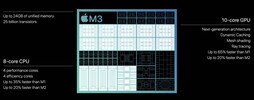Intel Core i7-4960HQ vs Apple M3
Intel Core i7-4960HQ
► remove from comparison
Der Intel Core i7-4960HQ ist ein High-End Quad-Core Prozessor auf Basis der Haswell-Architektur, der im dritten Quartal 2013 vorgestellt wurde. Dank Hyperthreading können die 4 Kerne gleichzeitig bis zu 8 Threads bearbeiten. Die in 22 Nanometer gefertigte CPU taktet mit 2,6 GHz, kann per Turbo Boost aber Frequenzen von bis zu 3,8 GHz erreichen (weitere vermutete Turbo-Stufen: 4 Kerne: 3,6 GHz, 2 Kerne: 3,7 GHz). Eine Besonderheit ist die schnelle integrierte GT3e-Grafikeinheit mit eigenem eDRAM-Speicher (128 MB, 77 mm², on-Package, 102 GB/s).
Haswell ist der Nachfolger der 2012 vorgestellten Ivy-Bridge-Architektur und soll vor allem mit höherer Performance und verbesserter Energieeffizienz punkten. So wurde sowohl die Sprungvorhersage optimiert als auch die Zahl der Ausführungseinheiten erhöht, wodurch die Pro-MHz-Leistung um knapp 10 Prozent gesteigert werden konnte. Neue Befehlssatzerweiterungen wie AVX2 und FMA sollen die Performance in darauf ausgelegten Anwendungen zusätzlich verbessern.
Da die Turbo-Stufen des Core i7-4960HQ exakt denen des i7-4900MQ entsprechen, ist trotz der geringeren Basistaktrate mit einer vergleichbaren Performance zu rechnen. Diese dürfte in etwa an das ehemalige, Ivy-Bridge-basierte Topmodell Core i7-3940XM heranreichen. Auch anspruchsvollste Anwendungen meistert der i7-4960HQ damit ohne Schwierigkeiten.
Für die Grafikausgabe zeigt sich die im Prozessor integrierte Iris Pro Graphics 5200 mit 40 Execution Units verantwortlich, die mit 200 - 1300 MHz taktet. Die Iris Pro bietet eine rund 50 Prozent höhere Performance als die HD Graphics 4600 anderer Haswell-CPUs und erreicht sogar das Leistungsniveau dedizierter Mittelklasse-Grafikkarten wie der GeForce GT 740M.
Die TDP von 47 Watt schließt neben den CPU-Kernen auch die Grafikeinheit, die Northbrige inklusive Speichercontroller sowie Teile der Spannungswandler ein. Damit ist die CPU am besten für große Notebooks ab etwa 15 Zoll geeignet.
Apple M3
► remove from comparison
Der Apple M3 ist ein System on a Chip (SoC) von Apple für Notebooks der gegen Ende 2023 vorgestellt wurde. Er integriert eine neue 8-Kern-CPU mit 4 Performance Kernen mit bis zu 4,06 GHz und 4 Effizienzkernen mit 2,8 GHz. Apple gibt an das die CPU um bis zu 20% schneller ist als im alten Apple M2 (3.5 GHz).
Die Prozessorleistung ist durch die höheren Taktraten und Architekturverbesserungen auch in Benchmarks deutlich besser als der M2 und kann in Einzelkerntests mit den schnellsten CPUs mithalten.
Der M3 integriert weiters eine neue Grafikkarte mit Dynamic Caching, Mesh Shading und Ray-Tracing-Beschleunigung per Hardware. Laut Apple soll sie um 20% schneller sein als die GPU im M2. Der Chip integriert 10-GPU-Kerne, im kleinen Modell (z.B. iMac) sind jedoch nur 8 Kerne aktiv. Weiterhin unterstützt die GPU jedoch nur 2 Displays (ein zusätzliches 6K60 Display zum internen).
GPU und CPU können gemeinsam auf den gemeinsamen Speicher auf dem Package zugreifen (Unified Memory). Dieser ist weiterhin in 8, 16 und 24 GB-Varianten erhältlich und bietet 100 GB/s maximale Bandbreite.
Die integrierte 16-Kern Neural Engine wurde ebenfalls überarbeitet und bietet nun 18 TOPS Spitzenleistung (versus 15,8 TOPS beim M2 aber 35 TOPS im neuen A17 Pro). Die Video-Engine unterstützt nun auch AV1 Dekodierung in Hardware. H.264, HEVC und ProRes (RAW) können weiterhin de- und enkodiert werden.
Das integrierte WLAN unterstützt leider nur weiterhin WiFi 6E (kein WiFi 7) und durch den Support nur eines einzelnen externen Monitors bleibt dem Chip auch Thunderbolt 4 verwehrt (Thunderbolt 3/USB4 Support offiziell mit 40 Gbit/s).
Der Chip wird im aktuellen 3nm Prozess (N3B) bei TSMC hergestellt und beinhaltet 25 Milliarden Transistoren (+25% vs. Apple M2). Dies soll auch zur hervorragenden Effizienz des Chips beitragen. Unter Last verbraucht der M3 etwa 20 Watt.
| Model | Intel Core i7-4960HQ | Apple M3 | ||||||||||||||||||||||||||||||||||||||||||||||||||||||||||||||||||||||||||||||||||||||||||||||||||||||||||||||||||||||||||||||||||||||||||||||||||||||||||||||||
| Codename | Haswell | |||||||||||||||||||||||||||||||||||||||||||||||||||||||||||||||||||||||||||||||||||||||||||||||||||||||||||||||||||||||||||||||||||||||||||||||||||||||||||||||||
| Series | Intel Core i7 | Apple M3 | ||||||||||||||||||||||||||||||||||||||||||||||||||||||||||||||||||||||||||||||||||||||||||||||||||||||||||||||||||||||||||||||||||||||||||||||||||||||||||||||||
| Serie: M3 |
|
| ||||||||||||||||||||||||||||||||||||||||||||||||||||||||||||||||||||||||||||||||||||||||||||||||||||||||||||||||||||||||||||||||||||||||||||||||||||||||||||||||
| Clock | 2600 - 3800 MHz | 2748 - 4056 MHz | ||||||||||||||||||||||||||||||||||||||||||||||||||||||||||||||||||||||||||||||||||||||||||||||||||||||||||||||||||||||||||||||||||||||||||||||||||||||||||||||||
| L1 Cache | 256 KB | |||||||||||||||||||||||||||||||||||||||||||||||||||||||||||||||||||||||||||||||||||||||||||||||||||||||||||||||||||||||||||||||||||||||||||||||||||||||||||||||||
| L2 Cache | 1 MB | 4 MB | ||||||||||||||||||||||||||||||||||||||||||||||||||||||||||||||||||||||||||||||||||||||||||||||||||||||||||||||||||||||||||||||||||||||||||||||||||||||||||||||||
| L3 Cache | 6 MB | |||||||||||||||||||||||||||||||||||||||||||||||||||||||||||||||||||||||||||||||||||||||||||||||||||||||||||||||||||||||||||||||||||||||||||||||||||||||||||||||||
| Cores / Threads | 4 / 8 | 8 / 8 4 x 4.1 GHz Apple M3 P-Core 4 x 2.7 GHz Apple M3 E-Core | ||||||||||||||||||||||||||||||||||||||||||||||||||||||||||||||||||||||||||||||||||||||||||||||||||||||||||||||||||||||||||||||||||||||||||||||||||||||||||||||||
| TDP | 47 Watt | |||||||||||||||||||||||||||||||||||||||||||||||||||||||||||||||||||||||||||||||||||||||||||||||||||||||||||||||||||||||||||||||||||||||||||||||||||||||||||||||||
| Transistors | 1700 Million | 25000 Million | ||||||||||||||||||||||||||||||||||||||||||||||||||||||||||||||||||||||||||||||||||||||||||||||||||||||||||||||||||||||||||||||||||||||||||||||||||||||||||||||||
| Technology | 22 nm | 3 nm | ||||||||||||||||||||||||||||||||||||||||||||||||||||||||||||||||||||||||||||||||||||||||||||||||||||||||||||||||||||||||||||||||||||||||||||||||||||||||||||||||
| Die Size | 260 mm2 | |||||||||||||||||||||||||||||||||||||||||||||||||||||||||||||||||||||||||||||||||||||||||||||||||||||||||||||||||||||||||||||||||||||||||||||||||||||||||||||||||
| max. Temp. | 100 °C | |||||||||||||||||||||||||||||||||||||||||||||||||||||||||||||||||||||||||||||||||||||||||||||||||||||||||||||||||||||||||||||||||||||||||||||||||||||||||||||||||
| Socket | FCBGA1364 | |||||||||||||||||||||||||||||||||||||||||||||||||||||||||||||||||||||||||||||||||||||||||||||||||||||||||||||||||||||||||||||||||||||||||||||||||||||||||||||||||
| Features | Iris Pro Graphics 5200 (200 - 1300 MHz), DDR3(L)-1600 Memory Controller, HyperThreading, AVX, AVX2, Quick Sync, Virtualization, vPro, AES-NI | ARMv8 Instruction Set | ||||||||||||||||||||||||||||||||||||||||||||||||||||||||||||||||||||||||||||||||||||||||||||||||||||||||||||||||||||||||||||||||||||||||||||||||||||||||||||||||
| iGPU | Intel HD Graphics 4600 (200 - 1300 MHz) | Apple M3 10-Core GPU | ||||||||||||||||||||||||||||||||||||||||||||||||||||||||||||||||||||||||||||||||||||||||||||||||||||||||||||||||||||||||||||||||||||||||||||||||||||||||||||||||
| Architecture | x86 | ARM | ||||||||||||||||||||||||||||||||||||||||||||||||||||||||||||||||||||||||||||||||||||||||||||||||||||||||||||||||||||||||||||||||||||||||||||||||||||||||||||||||
| $657 U.S. | ||||||||||||||||||||||||||||||||||||||||||||||||||||||||||||||||||||||||||||||||||||||||||||||||||||||||||||||||||||||||||||||||||||||||||||||||||||||||||||||||||
| Announced | ||||||||||||||||||||||||||||||||||||||||||||||||||||||||||||||||||||||||||||||||||||||||||||||||||||||||||||||||||||||||||||||||||||||||||||||||||||||||||||||||||
| Manufacturer | ark.intel.com | www.apple.com |
Benchmarks
Average Benchmarks Intel Core i7-4960HQ → 100% n=1
Average Benchmarks Apple M3 → 237% n=1
* Smaller numbers mean a higher performance
1 This benchmark is not used for the average calculation













